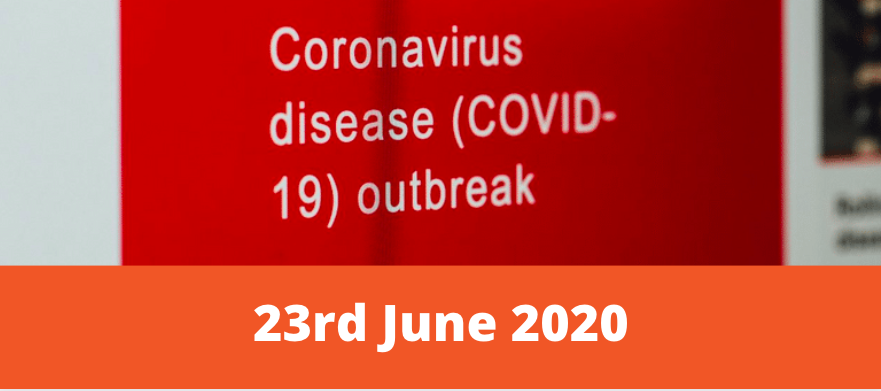Our weekly summary of ongoing advocacy initiatives, interesting surveys and research, government developments and useful resources. Contact us if you’d like to get this update directly into your inbox!
1. Ongoing advocacy initiatives
Everyone out? Preventing evictions from asylum accommodation into homelessness during COVID-19
Asylum Matters and NACCOM have produced a
joint policy paper on the situation for people living in asylum accommodation who face a ‘cliff edge’ if current emergency measures are withdrawn at the end of this month. The paper calls for the continued suspension of evictions from asylum accommodation for at least the next 12 months or longer while COVID-19 poses a public health risk; a permanent end to no recourse to public funds (NRPF) conditions and a new duty and funding for local authorities to house everyone at risk of homelessness.
A number of local authorities have already voiced their support for the suspension of NRPF conditions, and just last week, a coalition of organisations wrote to a number of Councils calling for further action to provide support to homeless people subject to NRPF conditions. We’re now reaching out to local authorities who participate in asylum dispersal to ask them to support the calls for an end to NRPF conditions, as well as demanding further protections from eviction for people seeking asylum.
If you are interested in working with your local authority to get their support on these important issues, do get in touch with Asylum Matters or NACCOM directly – contact details are on the policy paper.
Home for All campaign
Crisis have launched a new campaign,
Home for All, calling on the UK Government to commit to a plan that will enable everyone across Britain to have the security of a safe and settled home; and to implement the immediate policy changes and funding needed to continue to protect people experiencing homelessness and prevent homelessness for the duration of the pandemic. The campaign calls for a new duty on local authorities, along with funding, to house everyone at risk of homelessness; the suspension of NRPF conditions; a further extension on protections from eviction for people in asylum accommodation; and the implementation of Housing First policies.
#APrayerForLegalAid
Young Legal Aid Lawyers have launched a new campaign, #APrayerForLegalAid, to highlight that the new Coronavirus regulations being brought forward by the UK Government on legal aid fees in asylum cases will make legally aided asylum and immigration work financially unviable and harm access to justice. They are calling on people to
contact their MPs to support an Early Day Motion opposing the changes.
2. Research and Reports
‘Beyond Belief’: How the Home Office fails survivors of torture at the asylum interview
A new report from Freedom from Torture sheds light on the experiences of people seeking asylum at their interviews with the Home Office, revealing a culture of disbelief, insensitivity and a failure to see the human behind the application. The report calls for a fundamental culture change at the Home Office to ensure that those fleeing persecution are protected.
Beyond the data: Understanding the impact of COVID-19 on BAME groups
Public Health England has published its
full report into the disproportionate mortality rate from COVID-19 among Black, Asian and minority ethnic people. It notes that:
‘The effects of hostile environments against immigrants, particularly failed asylum seekers and undocumented immigrants, might affect settled BAME populations adversely through heightened prejudice and societal tensions. For many BAME communities, lack of trust of NHS services and treatment resulted in their reluctance to seek care on a timely basis, again resulting in late presentation with disease. Others were also fearful of being deported if they presented to hospital.’
Local authority call for evidence on NRPF provision during COVID-19
The University of Wolverhampton, ASIRT, Migrants’ Rights Network, Project 17 and Public Interest Law Centre are carrying out a rapid research project into support for people with No Recourse to Public Funds during the Covid-19 pandemic.
Their
survey for council officers aims to identify challenges and emerging areas of good practice.
The deadline for responses is July 6 2020 and the survey should take no longer than 15 minutes to complete.
Doctors of the World Briefing on Homelessness during the COVID-19 pandemic
In light of increasing concerns about future funding for the Everyone In scheme, Doctors of the World have compiled a briefing highlighting the key findings from their recent
Rapid Needs Assessment of Excluded People in England During the 2020 COVID-19 Pandemic in relation to supporting People Experiencing Homelessness and the importance of ongoing accommodation support, during and beyond the pandemic and the successful aspects of the Everyone In policy.
Scottish Refugee Council polling reveals support for positive changes to the asylum system
A survey carried out by Survation on behalf of the Scottish Refugee Council has found broad support for positive changes to the asylum system, including:
73% think people seeking asylum should be allowed to work to support themselves and their families;
52% think people seeking asylum should receive financial support in line with current rates of Universal Credit;
74% believe it’s important to make refugees feel welcome in Scotland;
59% believe it would be better for Scotland to run its own asylum and immigration system.
3. Home Office and Government Developments
Report: Home Office preparedness for Covid-19 (coronavirus)
The Home Affairs Select Committee
has published its report on the Home Office’s response to the impact of Covid-19 on the immigration system. Among its recommendations it calls for ensuring that the Home Office makes clear up-to-date guidance publicly accessible and the temporary lifting of NRPF conditions for the duration of the pandemic.
Report: National Audit Office Immigration Enforcement
The National Audit Office has published a
report on immigration enforcement and the Home Office’s management of people with irregular migration status. Looking at the effect of Hostile Environment policies to limit irregular migration, the report concludes that, by its own admission, the Home Office had
‘no specific evidence base’ to support introducing these measures and
‘is currently unable to measure whether these activities have the desired effect of encouraging people to leave voluntarily.’
Report: Department for Work and Pensions response to Covid-19
The
Work and Pensions Select Committee has published its report on the DWP’s response to the coronavirus outbreak. The committee recommends that the Government raises the rate of ‘legacy’ benefits to match that of Universal Credit; as well as the immediate suspension of NPRF conditions.
4. Resources and what we’ve been reading …
Refugee Week: People making a difference during COVID-19
For Refugee Week, IMIX published two
blog posts with positive stories to share of refugees and people seeking asylum making a difference in their communities and supporting others during the pandemic.
Asylum Matters also shared videos from two incredible refugee activists in the North East –
Shams and
MD – who were imagining a better world for refugees and the changes they’d like to see in the UK.
Race, racism and immigration in the United Kingdom: Black Lives Matter
This blog post on Freedom of Movement takes a long view of the development of the UK’s immigration system and its deep links to racism and imperial history, coming to the conclusion that ‘in my view we have witnessed tangible increases in race discrimination in the immigration system in the last decade.’
Windrush Day 2020: Lessons Learnt?
22nd June was Windrush Day. In 2018, the Windrush scandal exposed structural issues and discrimination within the Home Office and the devastating impact of hostile environment policies, which left members of the Windrush generation forced into destitution, and in some cases, forcibly deported away from their homes in the UK.
You can read the full Windrush Lessons Learned review here. However, the recommendations have still not yet been implemented, despite repeated calls from campaigners. A petition from Patrick Vernon OBE which calls for full implementation of all recommendations currently has over 130,000 signatories.
Finally, these blogs from Global Justice Now and Freedom from Torture are helpful overviews of the Windrush scandal and how to challenge hostile environment policies.


